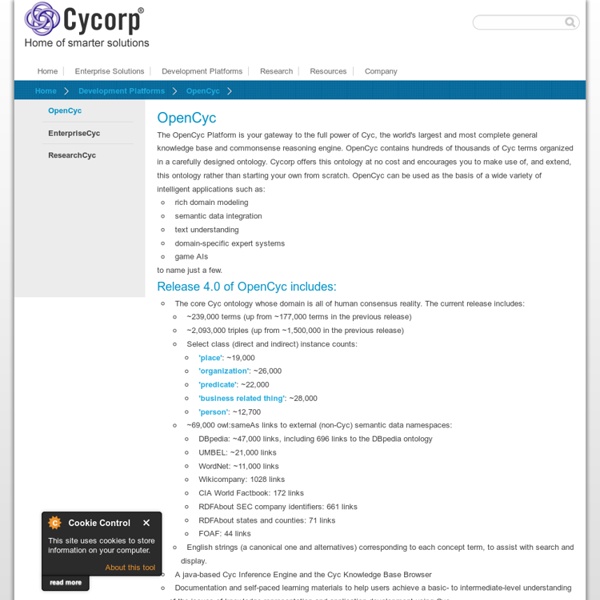



Tools This page gives an overview of software tools related to the Semantic Web or to semantic technologies in general. Due to the large amount of tools being created in the community, this site is always somewhat outdated. Contributions and updates are welcomed. See also: Tool Chains Adding your own Adding your own tool is as easy as creating a page. Do not forget to use a suitable category to classify the tool, otherwise it will not appear below. If your tool is an OWL 2 implementation or a RIF implementation not yet listed here, please consider to add it. Current tools on semanticweb.org.edu The following tools are currently recorded in this wiki. RDF2Go (Version 4.8.3, 4 June 2013) Bigdata (Version 1.2.3, 31 May 2013) Semantic Measures Library (Version 0.0.5, 4 April 2013) HermiT (Version 1.3.7, 25 March 2013) Fluent Editor (Version 2.2.2, 20 March 2013) The following is a list of all tools currently known (use the icons in the table header to sort by any particular column)
About WordNet - WordNet - About WordNet Verbots® - Open Source Natural Language Chatterbots Standard Upper Ontology The Tabulator (1) Tim Berners-Lee Tim coded up the original version at odd times in November and December 2005. See Links on the Semantic Web from Dec 2005 Undergraduate Research Opportunity Program (UROP) over June-August 2006 people are below. Yushin Chen "Joyce" wrote the calendar views, and incorporated the Simle timeline. Lydia Chilton Lydia is working on statistical analysis, charts, etc. Ruth Dhanaraj Ruth worked on the Tabulator in January 2006, adding the asynchronous fetching of documents during queries, etc. Adam Lerer Adam works on the back-end -- the query system, and generic stuff around the query UI. Jim Hollenbach Jim is responsible for the map view. David Sheets David wrote the RDF parser, and does a lot of architecture and release engineering. Thanks also to Dan Connolly and Ralph Swick for co-supervising students and for ideas, support, testing and encouragement. When you use these techniques on the server, the tabulator works better. pulling in data from the web as you go.
Web Sémantique:Ontologie Braina - Artificial Intelligence Software for Windows Braina (Brain Artificial) is an intelligent personal assistant software for Windows PC that allows you to interact with your computer using voice commands in English language. Braina makes it possible for you to control your computer using natural language commands and makes your life easier. Braina is not an average Siri or Cortana clone for PC. It isn't like a chat-bot, its priority is to be super functional and to help you in doing tasks. You can either type commands or speak to it and Braina will understand what you want to do. Braina is still an infant. Braina helps you do things you do everyday.
DCMI Metadata Terms Table of Contents Index of Terms Section 1: Introduction and Definitions This document is an up-to-date, authoritative specification of all metadata terms maintained by the Dublin Core Metadata Initiative. Included are the fifteen terms of the Dublin Core Metadata Element Set, which have also been published as IETF RFC 5013 [RFC5013], ANSI/NISO Standard Z39.85-2007 [NISOZ3985], and ISO Standard 15836:2009 [ISO15836]. Each term is specified with the following minimal set of attributes: Where applicable, the following attributes provide additional information about a term: This release of DCMI Metadata Terms reflects changes described more fully in the document "Maintenance changes to DCMI Metadata Terms" [REVISIONS]. References Section 2: Properties in the /terms/ namespace Section 3: Properties in the /elements/1.1/ namespace Section 4: Vocabulary Encoding Schemes Section 5: Syntax Encoding Schemes Section 6: Classes Section 7: DCMI Type Vocabulary Errata:
Tabulator: Generic data browser The Tabulator project is a generic data browser and editor. Using outline and table modes, it provides a way to browse RDF data on the web. RDF is the standard for inter-application data exchange. You can use it in two ways As a Firefox Add-on The tabulator extension is a Firefox extension which allows Firefox to handle data as well as documents. As a web application The tabulator online version is a set of open source Javascript scripts ("AJAX") which can run in any web page to add data browsing. The Tabulator is open source under the W3C software license. Try it: About it: Publications: Berners-Lee, T., Hollenbach, J., Lu, K., Presbrey, J., Pru d'ommeaux, E. and schraefel, m. c. , Tabulator Redux: Writing Into the Semantic Web, unpublished, 2007. For Developers: Thanks to all those who have provided feedback, code patches etc. Data links Only if you have a data browser, such as ffox+Tabulator extension, installed. Tabulator project
Ncbo